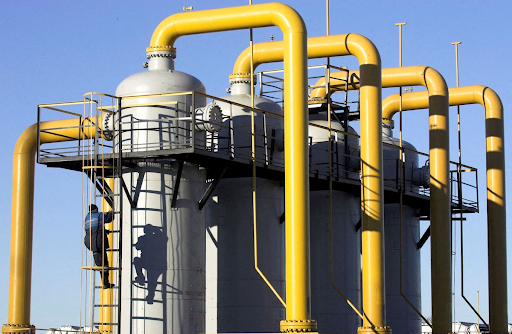Europe Sacrifices Green Efforts Due to War in Ukraine
A worker climbs a cylinder at a gas compressor station at the Yamal-Europe pipeline. Photo: Vasily Fedosenko/ Reuters
Europe is facing a worsening energy crisis and will be forced to put their green ambitions on hold due to the Russian invasion of Ukraine. In order for Europe to protect itself from potential gas stoppage from its current and largest energy supplier, Russia, policy makers in Europe are planning to take emergency measures. These measures go against Europe’s collective effort in recent years to protect the environment, which will lead to an increase in emissions, at least in the short-term.
On Feb. 28, EU energy ministers called an emergency meeting to discuss the potential scenarios that could develop due to the Russian invasion of Ukraine. A particularly pressing uncertainty surrounding the issue is the possibility of Russian retaliation after western governments’ decision to impose harsh sanctions against Russia. One other factor adding on to the issue is the possibility of military conflict causing damage to one of the pipelines that crosses Ukraine.
European officials have expressed their plans to put policies in place against the amounting pressure of energy insecurity. According to an article by Bloomberg, some of these plans are to “increase gas-import capacities, build new LNG terminals, stockpile more coal and reopen power plants that burn the dirtiest fossil fuel.” These measures are in contradiction with the EU’s push to go green in recent years. As part of the European Green Deal, the bloc adopted a strict binding emissions-reduction target for 2030 and is in the on-going process of negotiating the set of legislation in the target’s implementation. The main strategies proposed in Europe’s green shift are centered around phasing out traditional energy sources and transitioning to alternative ones. Now in the crisis, European countries like Germany and Italy are making plans to expand LNG import capacities and prolong the use of coal.
As EU Energy Commissioner Kadri Simson stated, “we can’t exclude that Russia will take retaliatory steps that will impact the energy trade,” Europe is facing the very real threat of losing Russia’s energy supply. This would be a very hard hit on the bloc despite the existence of alternative partners, since Russian gas import currently makes up around 35 percent of Europe’s total and many alternative routes to deliver gas to Europe. The one from Norway is already at full capacity.
Chart on EU Gas imports by state in 2020. Photo: Bloomberg
Although physical deliveries of gas from Russia to Europe have so far remained largely undisturbed and a recent study has found that Europe’s economy will survive the risk, the fear of a gas supply stoppage has already caused European energy prices to reach record levels. According to a Reuters report, “European and British gas prices soared on Wednesday, with a benchmark Dutch front-month gas contract at the TTF hub hitting a record intraday high of 185 euros a tonne.” European Natural Gas Analyst Leon Izbicki attributed the price change directly to the political uncertainty around Ukraine, stating that "the main driver behind the sharp rise in the TTF is a perceived increase in the risk of European sanctions targeting Russian energy exports."
While European policy makers are being pressured into stepping back from their environmental pledges to protect their economy from the risk, environmental group Deutsche Umwelthilfe warned that these emergency policies to help in the short-term could increase Europe’s dependence on gas in the future. According to an article by Financial Times, the EU’s dependence on Russian gas has long hindered its political capacity to wield punishing sanctions on Russia, as well as made it vulnerable to gas-price fluctuations. For Mark Lewis, Andurand Capital Management’s head of climate research, the strategic decision for Europe in the long run points to energy independence by decarbonizing its energy system. As Europe looks to the international community for alternative gas suppliers, there is also an increasing call for renewable solutions like nuclear energy.


